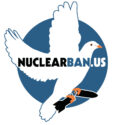The historic United Nations Treaty on the Prohibition of Nuclear Weapons is nearing entry into force as international law. The response of the Trump administration, according to a new report by the Associated Press, is a letter to the countries that have already ratified the treaty, asking them to withdraw. Such interference in a United Nations disarmament treaty is unprecedented.
Since being adopted by 122 countries in 2017, the treaty has so far been signed by 84 countries, and ratified by 47. It is awaiting its 50th ratification, which may occur as soon as this Friday, October 23, the eve of the 75th anniversary of the United Nations. The first order of business at the U.N.’s founding in 1945 was to address the nuclear threat.
Ninety days after the 50th ratification, the treaty will enter into force as international law. The nine nuclear-armed nations (U.S., Russia, China, U.K., France, Israel, India, Pakistan, North Korea), who have so far boycotted the treaty, will then find themselves in violation of international law, as will the 26 nuclear weapons companies who have operations, contracts, suppliers and investors in many of the countries that have already joined this treaty.
The International Campaign to Abolish Nuclear Weapons (ICAN), which includes over 500 organizations in 103 countries, won the 2017 Nobel Peace Prize “for its work to draw attention to the catastrophic humanitarian consequences of any use of nuclear weapons and for its ground-breaking efforts to achieve a treaty-based prohibition of such weapons.”
The treaty forbids everything to do with nuclear weapons, including developing, testing, producing, manufacturing, otherwise acquiring, possessing, stockpiling, transferring, using or threatening to use nuclear weapons. Already, the treaty has led to significant divestment by institutions around the world that decline to finance nuclear weapons, for moral or fiduciary reasons.
Unlike previous nuclear treaties, created (and many subsequently abrogated) by the nuclear-armed nations, this one comes from the rest of the world, since all countries are at risk from nuclear weapons use, production, and testing.
According to the AP,
The U.S. letter sent to participating countries says the five original nuclear powers — the U.S., Russia, China, Britain and France — and America’s NATO allies “stand unified in our opposition to the potential repercussions” of the treaty.
It says the treaty “turns back the clock on verification and disarmament and is dangerous” to the half-century-old Nuclear Nonproliferation Treaty, considered the cornerstone of global nonproliferation efforts.
“Although we recognize your sovereign right to ratify or accede to the Treaty on the Prohibition of Nuclear Weapons (TPNW), we believe that you have made a strategic error and should withdraw your instrument of ratification or accession,” the letter says…
Beatrice Fihn, executive director of the International Campaign to Abolish Nuclear Weapons… told The Associated Press Tuesday that several diplomatic sources confirmed that they and other states that ratified the TPNW had been sent letters by the U.S. requesting their withdrawal.
She said the “increasing nervousness, and maybe straightforward panic, with some of the nuclear-armed states and particularly the Trump administration” shows that they “really seem to understand that this is a reality: Nuclear weapons are going to be banned under international law soon.”
Fihn dismissed the nuclear powers’ claim that the treaty interferes with the Nuclear Nonproliferation Treaty as “straightforward lies, to be frank.”
“They have no actual argument to back that up,” she said. “The Nonproliferation Treaty is about preventing the spread of nuclear weapons and eliminating nuclear weapons, and this treaty implements that. There’s no way you can undermine the Nonproliferation Treaty by banning nuclear weapons. It’s the end goal of the Nonproliferation Treaty.”
In Northampton, Massachusetts, Dr. Timmon Wallis found news of the Trump administration’s letter unsurprising. Wallis was involved in the treaty negotiations, and co-founded ICAN partner NuclearBan.US to promote the treaty in the United States.
He said, “The U.S. government has been trying to stop this treaty from the very beginning, threatening to withhold aid from countries that signed it, for example. But they have now stooped to a new low by trying to get countries to break a treaty they have already joined. Of course this just proves how powerful and important this treaty actually is in terms of undermining the trillion dollar US nuclear weapons industry.”
NuclearBan.US co-founder Vicki Elson added, “Well, it’s nice that the nuclear nations all have something in common! They all love their weapons of mass extinction. But the world has spoken, the time has come, and nuclear weapons are going to be eliminated. Hopefully before they eliminate civilization, or life on earth.”







